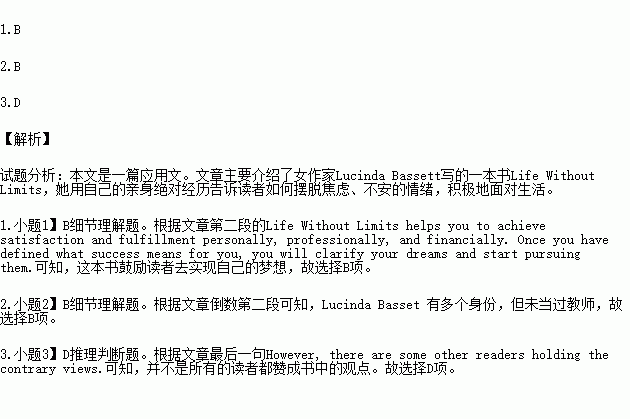题目内容
Product Description
Life Without Limits helps you clarify what you want in every area of your life. By using Bassett’s powerful techniques you will change; therefore your life will change. You control your life. And only you can take steps to change it. Life Without Limits helps you take back your power.
Life Without Limits helps you to achieve satisfaction and fulfillment personally, professionally, and financially. Once you have defined what success means for you, you will clarify your dreams and start pursuing them.
Product Details
Published in: 2001-12
Released on: 2001-12-24
Original language: English
Dimensions: 5.3 x 0.7 x 8 inches
Binding: Paperback
304 pages
About the Author
Lucinda Bassett is the founder and CEO of one of the most successful self-help companies in the country, the Midwest Center for Stress and Anxiety, Inc. Author of the national bestseller From Panic to Power, Lucinda Bassett produces and hosts the award-winning infomercial, Attacking Anxiety. She has shared her techniques with such clients as McDonalds, Chrysler, and AT&T. She has appeared on numerous talk shows, including Operah and The View, and been featured in Family Circle, Reader’s Digest, and many more.
Customer Reviews
This book has helped me to gain hope and courage to cope with all my fears and worries. Lucinda writes with such a great understanding and sympathy. She herself had problems with panic and worry. Her positive thinking tips are easy to follow. I don’t get lost in a lot of mental problems. It’s as if she were holding your hand, sitting right beside you, cheering you on! I believe I can do anything I set my mind to after reading this book. However, there are some other readers holding the contrary views.
1.What is Life Without Limits about?
A. It shows readers what Lucinda Bassett is.
B. It encourages readers to realize their dreams.
C. It describes how hard the actual life is.
D. It implies it is hard to control your life.
2.Lucinda Bassett works as all the following except _______.
A. hostess B. teacher C. writer D. businesswoman
3.We can conclude from the last paragraph that _______.
A. Lucinda has made a lot of money from the book
B. all the customers have some mental problems
C. Lucinda talks with the customer face to face
D. all the customers don’t agree with what Lucinda wrote
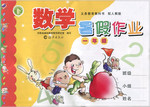 暑假作业海燕出版社系列答案
暑假作业海燕出版社系列答案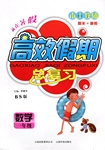 本土教辅赢在暑假高效假期总复习云南科技出版社系列答案
本土教辅赢在暑假高效假期总复习云南科技出版社系列答案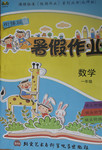 暑假作业北京艺术与科学电子出版社系列答案
暑假作业北京艺术与科学电子出版社系列答案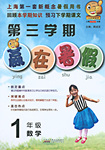 第三学期赢在暑假系列答案
第三学期赢在暑假系列答案